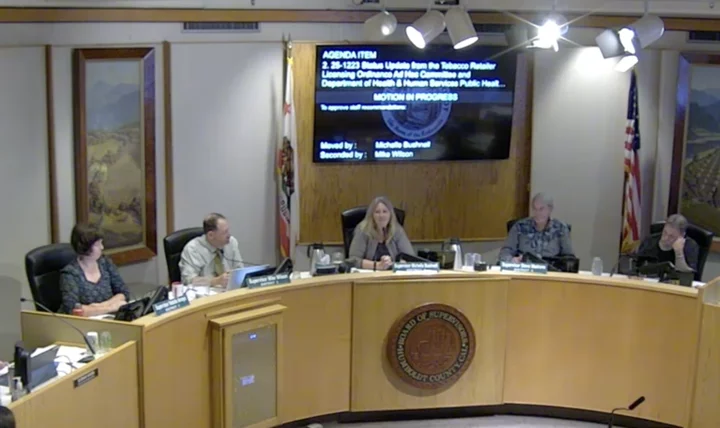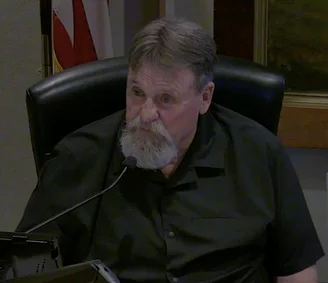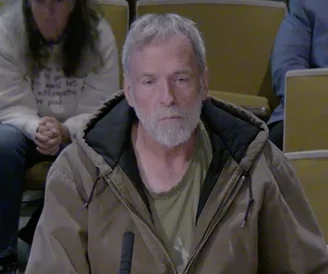Screenshot of Tuesday’s Humboldt County Board of Supervisors meeting.
###
At today’s meeting, the Humboldt County Board of Supervisors got into a tense debate over the fairness of the county’s Tobacco Retailer Licensing Ordinance.
At the heart of the dispute is a non-transferability clause that prevents tobacco retail licenses from being transferred when a business is sold. The ordinance, which only applies to retailers operating in unincorporated areas of the county, allows for a license to be transferred to a “parent, child, spouse, or domestic partner for tobacco retailing at the same retail location” if the current license holder is in good standing with the county. In all other circumstances, “a new tobacco retailer’s license is required whenever a tobacco retailing location has a change in proprietors.”
At the outset of the discussion, First District Supervisor Rex Bohn and Board Chair Michelle Bushnell both admitted that they must have overlooked the non-transfer clause when the board adopted the ordinance in July 2023.
“I did hear the grandfather part — it was mentioned — [but] I thought that meant that they would be able to transfer to anybody,” said Bohn, who was appointed to the Tobacco Retailer Licensing Ordinance ad hoc committee along with Fifth District Supervisor Steve Madrone. “We’re just still separated on what I feel is … a miscarriage of how [the ordinance] was presented, and [how] it was presented to the retailers.”
Bohn questioned whether staff with the Department of Health and Human Services (DHHS) Public Health Division had done an adequate job in researching the ordinance and communicating potential impacts to local retailers.
DHHS staff provided the board with a detailed presentation on the county’s ongoing outreach efforts, which began back in 2022. Sofia Pereira, the county’s public health director, emphasized that the primary focus of the ordinance is to protect youth and reduce accessibility to tobacco products. She noted that staff would be willing to investigate approaches taken by other counties to address some of the concerns brought forth by business owners.
Bohn mentioned a provision in Sonoma County’s ordinance that allows licenses to be transferred, and suggested that the county adopt something similar.He also highlighted a local tobacco retailer who operates “30-plus stores” across the state, including six in Humboldt. The only time he’s ever had an issue closing escrow on one of his businesses, Bohn said, was when he recently tried to sell a store in Humboldt.
“Out of five counties and this was the only place he couldn’t do it,” Bohn said. “I don’t think anybody understood that they were going to take a viable part of their business … and have it become a non-entity if they changed hands unless it went to a relative. This has taken quite a bit of financial toll on this one individual. It’s actually degraded the business’s values.”
During public comment, several local business owners claimed they didn’t know anything about the ordinance before it took effect. Tom Bero, owner of the Redwoods Market & Deli in Myers Flat, said he didn’t know about the non-transfer clause until he listed his business for sale.
“We didn’t get any information on the new ordinance,” Bero said. “Our market’s been there for about 50 years, and it’s always been able to sell tobacco. We’re in the middle of trying to sell our business … and the person purchasing the business does not want to purchase it unless he can apply for a new license or we can transfer our license. Our family relies on the sale of this business because we want to move on and do something else. … It’s getting to be too much.”
Dan Noga, owner of Country Club Market in the Humboldt Hill community, recalled county staff inspecting his business, but said he was never told that he couldn’t transfer his license. Noga asked why the county has set its sights on tobacco retailers rather than liquor stores and cannabis dispensaries.
“Ingesting any smoke into your lungs is not good for your health,” he said. “Yet, there’s tons of marijuana shops that are being approved, and there’s no restrictions on them. … Liquor is bad for your health — just like cigarettes are — yet a liquor license is transferable. I don’t see the problem with transferring a license from one retailer to the next retailer. I understand if you don’t want a new retailer with a tobacco license.”
One speaker, who did not identify himself, noted that most of the business owners who rely on tobacco sales to stay afloat don’t have pensions or retirement funds. “This business is the pension,” he said. “If somebody loses a [significant] portion of their sales, they will not be able to sell the business.”
Following public comment, Fourth District Supervisor Natalie Arroyo noted that the board has had “no less than 10 meetings about tobacco retail licensing” and pushed back on the assertion that staff hadn’t done an adequate job in informing business owners about the new ordinance.
“I’m, frankly, a little bit miffed about the way that we’re talking about the outreach that has happened and the meeting conversations that we’ve had,” Arroyo said. “Not very often do I get ruffled by this board, but thank you for just kind of bearing with it to the staff that are working on this.”
Arroyo said she was open to potential amendments to the ordinance that would lessen the impact on local businesses, as long as those changes didn’t increase the cap on tobacco retail licenses in a given area. “I would actually love to see more restrictions on smoking products,” she added.
Third District Supervisor Mike Wilson felt similarly, emphasizing that the goal of the ordinance was to “reduce smoking and the harms of tobacco in general.” He recalled in 1998, when California became the first state to ban smoking inside.
“I remember very, very clearly the sort of language around the Armageddon that would occur [to] these businesses if that was to happen,” Wilson said. “Well, it turned out some months later that people still went to bars and people still went out. … I think the way that we deal with these changes over time is through caps, and that we do this through attrition. But I think the attrition that we were talking about was the transfer of these licenses.”
Madrone emphasized Arroyo’s previous point about outreach, noting that “it didn’t happen in a vacuum.” He also echoed Wilson’s point that the whole idea of the ordinance was to “reduce the number of outlets down to a cap based on our population.”
“And the way that was going to happen was that if a business [was] sold to somebody other than an immediate family member, that they would lose that license,” Madrone continued. “All of a sudden, it sounds like some people feel like they didn’t have any communication, but my understanding was that every effort was made to do that.”
Madrone also voiced frustration over Bohn “trying to push” his opinion at ad hoc meetings. “I don’t want to hear his comments for the 20th and 30th and 50th time on the same stuff over and over again.”
After a bit of additional discussion and a messy attempt at a straw poll, the board ultimately directed staff to further investigate license transfers, with a potential limit for business owners with multiple tobacco retail licenses. The board also asked staff to look into a cap on licenses within a certain radius of one another.
The motion passed in a 5-0 vote.



CLICK TO MANAGE